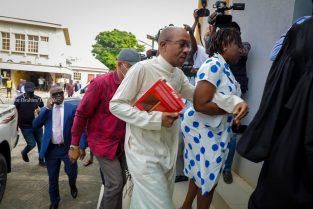In a stunning revelation, a special investigator appointed by President Bola Tinubu has exposed former Governor of the Central Bank of Nigeria (CBN), Godwin Emefiele, and his ex-deputies for approving an increase in their salaries without obtaining the necessary presidential approval.
Jim Obazee, the CBN special investigator, submitted his report to President Tinubu, detailing how Emefiele and his deputies decided on the salary increment during the 758th meeting of the Committee of Governors on September 14, 2022. The investigation further asserted that this review lacked the required approval from President Muhammadu Buhari and the Revenue Mobilisation Allocation and Fiscal Commission.
This revelation comes amidst previous reports accusing Emefiele of allegedly lodging public funds in over 593 bank accounts abroad without proper authorization. The special investigator’s findings may add to the legal troubles already faced by the ex-CBN governor, who is currently being prosecuted for a N1.2 billion procurement fraud.
In his report, Obazee recommended that criminal charges be filed against Emefiele, the Deputy CBN governors, and directors for various offenses.
The report also shed light on other alleged irregularities, such as the printing of money by the CBN without legal provision and the operation of secret reserves not disclosed in the bank’s financial statements. The document raised concerns about the mismatch between the CBN’s financial statements and its extensive financial interventions, suggesting the existence of undisclosed funds.
The former Executive Secretary of the Financial Reporting Council of Nigeria, Obazee, was appointed by President Tinubu in a letter dated July 28, 2023, to investigate these allegations.
Amidst these revelations, former deputy governor of the CBN, Kingsley Moghalu, criticized Emefiele, labeling him as the worst governor in the history of the central bank. Moghalu pointed to Emefiele’s perceived incompetence, handling of the naira exchange rate, provision of Ways and Means lending to the government, and an attempt to run for president as examples of his shortcomings.
As the investigations unfold and legal proceedings progress, these revelations raise questions about governance, financial accountability, and the need for comprehensive reforms in Nigeria’s institutions to ensure transparency and integrity.























